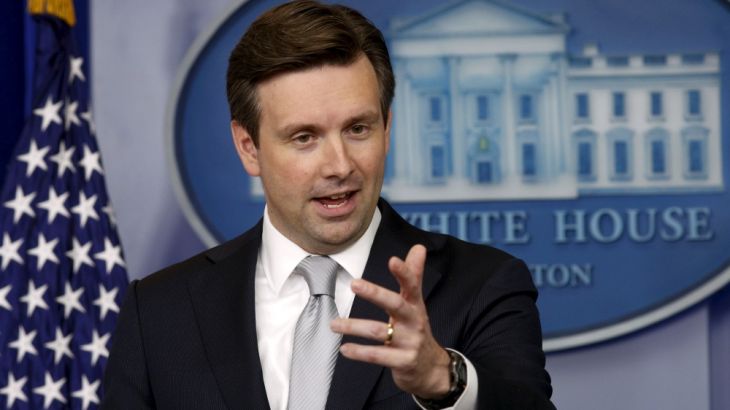Iran and world powers inch closer to nuclear deal
Joint statement expected on Tuesday after foreign ministers from six world powers met into the early hours in Vienna.

Marathon talks on a landmark nuclear deal with Iran have continued overnight, with officials from six world powers seeking to finalise an agreement to limit the Iranian nuclear programme.
Foreign ministers from Britain, China, France, Germany, Russia and the United States met in Vienna early on Tuesday morning, without Iranian officials present. The meeting lasted about an hour.
Keep reading
list of 4 itemsWho will be Iran’s next president? | Start Here
Oil slumps two percent on possible return of Iranian supply
Border security a common concern for Pakistan and Iran: Rouhani
They were expected to hold another meeting later on Tuesday morning ahead of a planned announcement that would potentially bring to a close an 18-day marathon push to strike an accord.
The Iranian Students’ News Agency reported that Iranian Foreign Minister Mohammad Javad Zarif and the European Union’s policy chief Federica Mogherini would read a joint statement on Tuesday morning.
All EU team at work on #IranTalks. Decisive hours pic.twitter.com/UNOTeUwkLw
— Federica Mogherini (@FedericaMog) July 12, 2015
The ISNA reported that the pair would be accompanied by the six foreign ministers in Vienna.
Iran and the six nations are hoping to sign a nuclear deal that will bring sanctions relief in exchange for curbs on Tehran’s atomic programme.
Earlier, on Monday, the US said that “real progress” had been made during the talks, but that issues remained.
“They have made genuine progress… but there continues to be some sticking points that remain unresolved,” White House spokesman Josh Earnest told reporters in Washington.
“The expectation right now is that the discussions will continue. I am not aware of any plan to take a break.”
Earnest said the US and its partners did not want to rush the final stages of the lengthy talks.
RELATED: Opinion: Why the US-Iran talks will succeed
Disputes persisted over attempts to probe Iran’s alleged work on nuclear weapons, diplomats told the AFP news agency, threatening plans to wrap up an international agreement by midnight – the latest in a series of deadlines for the negotiations.
|
|
The diplomats said at least two other issues still needed final agreement: Iranian demands that a UN arms embargo be lifted and that any UN Security Council resolution approving the broader deal no longer describe Iran’s nuclear activities as illegal.
US Secretary of State John Kerry has cautioned that “major issues” remain to be resolved, and comments from both senior Republican and Democrat Senators on Sunday suggested that any final deal would also face tough scrutiny in the US Congress.
Iranian President Hassan Rouhani said on Sunday further measures were still needed to overcome the remaining obstacles in the Vienna negotiations, ISNA reported.
Ali Vaez, from the International Crisis Group, told Al Jazeera that all of the parties knew what was at stake if they failed to come to an agreement.
“If either party miscalculates and thinks that the other side is in a position of weakness and is more keen to get an agreement than it is then I’m afraid this process can collapse and if that gamble fails basically, this opportunity is lost,” Vaez said.
“I don’t think it can be renewed a few months down the road because not only the parties will lose momentum but a tremendous amount of trust will be lost and that’s the biggest asset in the negotiations.”
Arms embargo
Among the biggest sticking points in the past week has been Iran’s insistence that a United Nations Security Council arms embargo and ban on its ballistic missile programme dating from 2006 be lifted immediately if an agreement is reached.
Russia, which sells weapons to Iran, has publicly supported Tehran on the issue.
Other problematic issues in the talks are access for inspectors to military sites in Iran, answers from Tehran over past activity and the overall speed of sanctions relief.